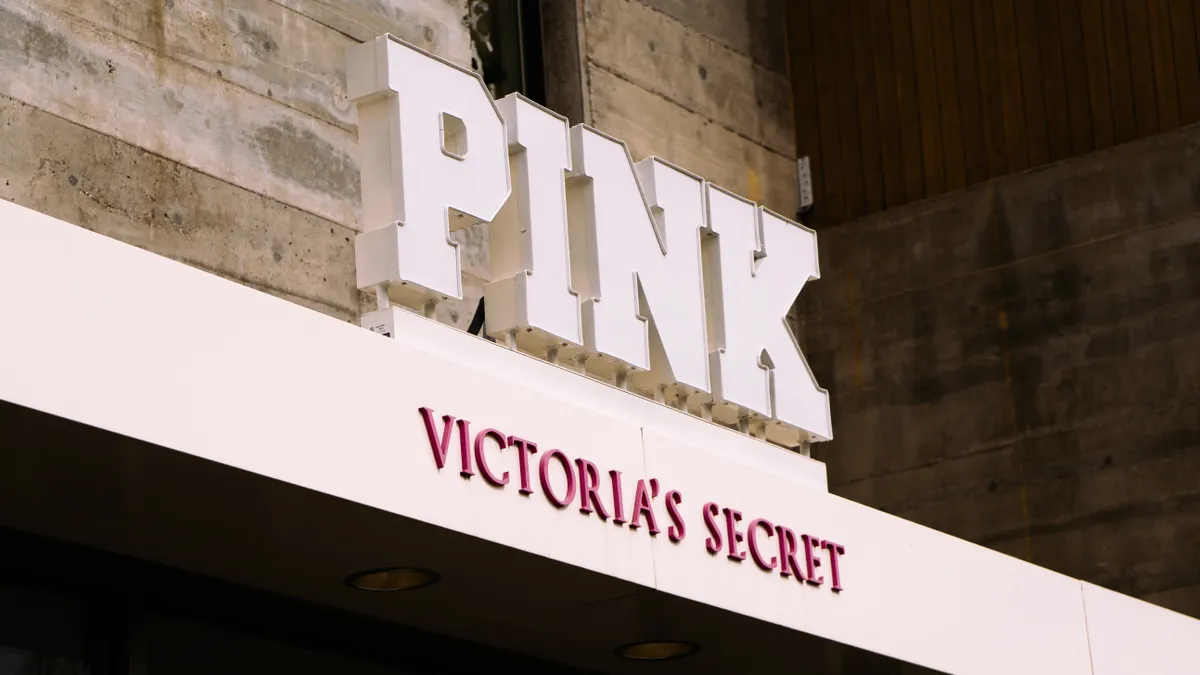Dive Brief:
-
Victoria's Secret & Co. held its top line mostly steady in Q1 but, according to GlobalData research, lost market share. Net sales were essentially flat to last year, nearing $1.4 billion, as comps dropped 1%.
-
Gross margin shrank by 170 basis points to 35.2%, but the lingerie chain reached $2.8 million in net income, from last year’s $2.5 million net loss. The security breach that scuttled its Memorial Day sale is expected to siphon about $10 million from Q2 operating income, excluding any insurance payment, CFO Scott Sekella said Wednesday.
-
Former Anthropologie Chief Marketing Officer Elizabeth Preis has taken that role at Victoria's Secret & Co., CEO Hillary Super announced on the earnings call. Executive Creative Director Adam Selman will now report to Preis. Super worked with Selman at Savage X Fenty and also previously led Anthropologie Group.
Dive Insight:
As Victoria’s Secret continues to throw off market share in an evolving segment, its turnaround is leaning heavily on its Pink brand. The lower-priced business, aimed at younger shoppers, never shouldered the baggage of the namesake label, which took years to pivot away from what many analysts and consumers viewed as outdated, sexist branding.
“I continue to be really bullish on Pink,” Super told analysts, adding that the brand has “an incredible amount of runway,” given that its top-line volume is more than $1 billion below its high. Its strength comes from existing and lapsed customers, less so from new ones. Customer acquisition will be a priority for Preis at both brands, Super said.
“As we start to build out the full lifestyle component, there's a beauty opportunity in Pink, there's an accessories opportunity in Pink, there's an enormous opportunity to regain share in apparel and to maintain our intimate business in that brand,” she also said. “So I see this as our No. 1 volume opportunity.”
Victoria's Secret & Co. is moving forward with its “store of the future,” applying the concept in the 16 or so stores it plans to open in North America this year, bringing the total to about 190, or about 25%, of that fleet, Sekella said. Abroad, the concept will be in 230 to 250 locations, or nearly 40% of the international fleet, he said. The 30 to 40 closures planned for the year will mostly be consolidations of co-located Victoria’s Secret and Pink stores.
The company is plugging away at its transformation under continued pressure from activist investor BBRC International. The Australian firm, which owns about 13% of the Victoria’s Secret & Co. shares, on Monday issued a scathing letter to board chair Donna James alleging mismanagement, insufficient board independence, excessive chair tenure and “disastrous” board-level decisions, among other claims.
“Given the lack of productive two-way dialogue that we would expect with a top stockholder, we urge VS to address the following issues during the June 11th earnings conference call,” the firm said, per financial filings.
The company did not acknowledge the letter during its call Wednesday. Last month, after BBRC disclosed its stake, Victoria’s Secret adopted a shareholder rights plan, also known as a poison pill, to preclude a hostile takeover.
Victoria’s Secret’s struggles provide BBRC with “grist to the mill,” but the firm isn’t really providing any ideas or vision of its own and “most of its statements have been carping,” according to GlobalData Managing Director Neil Saunders. Super, who arrived less than a year ago, is talented and needs more time, he said in emailed comments.
“Does BBRC have a point? Our view is maybe. We certainly think that there needs to be a clearer vision from Victoria's Secret, especially in terms of how it will deal with trends like the push to comfort, the rise of niche brands, and what it intends to do with Adore Me,” Saunders said. “Basically, Victoria's Secret remains a huge player in the space, but it is still really struggling to keep a grip on its market share.”
















